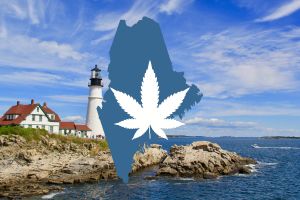Is Hemp Legal in Maine?
Posted by Tweedle Farms on Jan 12th 2022

Hemp, and more specifically hemp flower, has been at the forefront of agricultural and legal discussions in the United States, particularly with the evolving laws surrounding it’s cousin, THC-rich cannabis, and its many derivatives. Maine, known for its progressive stance on cannabis, presents a unique case in the legal framework of hemp flower cultivation, sale, and consumption. Today, on the Tweedle Farms blog, we’re going to dive in and do our best to offer some clarity and insight for growers, sellers, and consumers alike.
Understanding Hemp
Hemp, also colloquially known as CBD flower, is a variety of the Cannabis sativa plant species, distinct for its low psychoactive THC content. The legal distinction between hemp flower and THC-rich cannabis, aka marijuana, hinges on this THC content; hemp flower is defined federally as having 0.3% THC or less on a dry weight basis. This classification underscores the importance of understanding the chemical makeup of hemp, including cannabinoids like CBD (cannabidiol) and THCA (tetrahydrocannabinolic acid), which do not produce the "high" associated with marijuana.
Legal Framework for Hemp in Maine
Maine's approach to cannabis legislation has set a precedent for progressive policies in the United States. The state legalized medical marijuana in 1999 and recreational marijuana in 2016, reflecting a broader acceptance of cannabis. The legal framework for CBD flower specifically aligns with the 2018 Farm Bill, which federally legalized CBD flower cultivation and removed hemp from the Controlled Substances Act. Maine law complements this by regulating CBD flower cultivation and product manufacturing, emphasizing the alignment with federal THC thresholds.
Hemp Flower in Maine
CBD flower, the bud of the hemp plant, is legal in Maine as long as it adheres to the state and federal THC limits. The market for CBD flower is vibrant, catering to consumers seeking the benefits of cannabinoids without the psychoactive effects of high-THC cannabis. Regulations ensure that CBD flower products are tested and labeled accurately, providing transparency and safety for consumers.
THCA Flower: Navigating the Legal Nuances
THCA flower, which contains tetrahydrocannabinolic acid, is purported to be simply another hemp-derived product. THCA is a non-psychoactive precursor to THC, becoming psychoactive only when decarboxylated, which is, of course, the way the majority of cannabis is used. The legal status of THCA flower in Maine is nuanced, given its potential to convert to THC. Essentially, because it’s impossible to achieve a total THC content under 0.3% with THCA flower, the vast majority of it is illegal.
Regulatory Compliance and Licensing
Maine requires growers and sellers of CBD flower to adhere to strict licensing and regulatory standards. These include compliance with THC thresholds, accurate labeling, and adherence to agricultural best practices. The state's Department of Agriculture, Conservation and Forestry oversees hemp licensing, ensuring that all participants in the hemp industry meet state and federal guidelines.
Consumer Safety and Legal Purchasing
For consumers in Maine, purchasing CBD flower and other hemp products from licensed retailers ensures legality and safety. State regulations mandate rigorous testing for contaminants and potency, ensuring that products on the market meet stringent safety standards. Consumers are advised to verify product certifications and lab results to ensure compliance and safety.
Future of Hemp Legislation in Maine
The legal landscape for CBD flower and hemp products in Maine is subject to change, with potential legislative updates and regulatory adjustments on the horizon. Advocates and industry stakeholders closely monitor developments, anticipating changes that could further facilitate the growth of the hemp industry while ensuring consumer safety and regulatory compliance.
Conclusion
The legality of hemp in Maine reflects a balanced approach to cannabis regulation, recognizing the agricultural, economic, and therapeutic potential of hemp and its derivatives. With clear legal frameworks for CBD flower and other hemp products, Maine stands as a model for progressive hemp legislation. As laws evolve, staying informed and compliant remains paramount for all stakeholders in the hemp industry.



